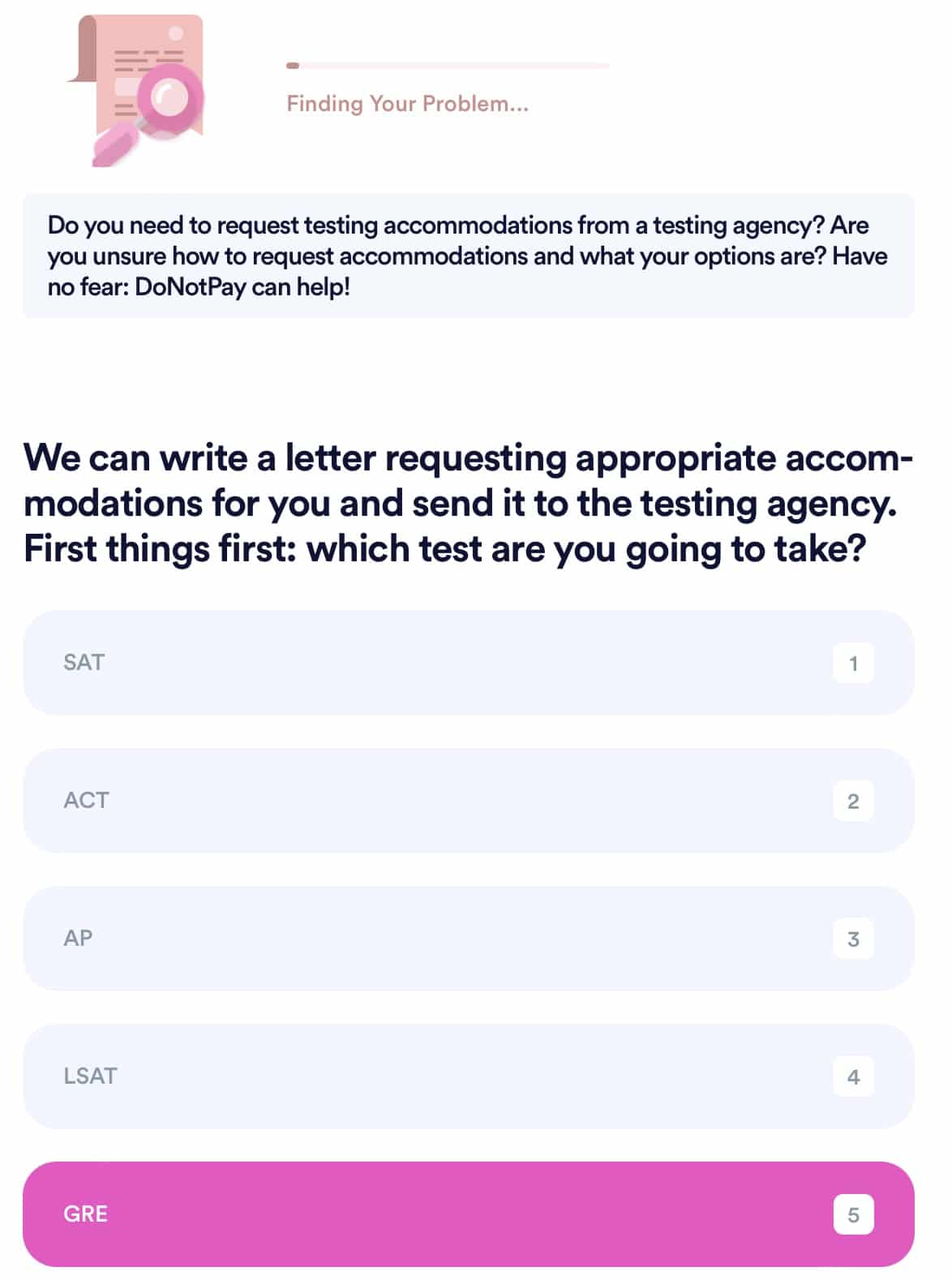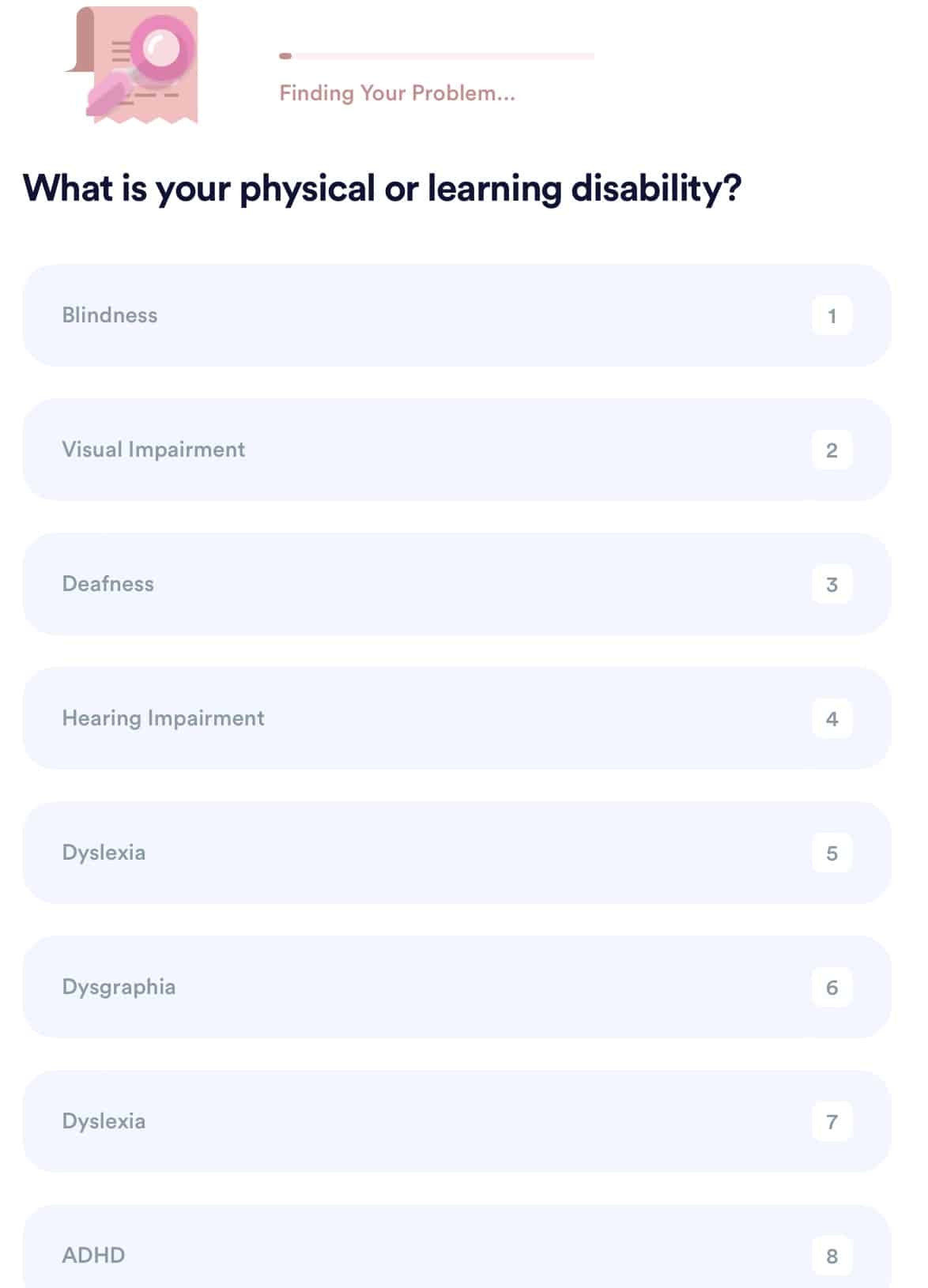Sample Letter of Accommodation for Students With Disabilities
Students with various types of disabilities can receive accommodations when taking standardized tests. To prove their disability, they need to have a letter of accommodations from their doctor or therapist.
However, requesting a letter of accommodations by yourself is not easy as a lot of documentation is involved, and the process can be tedious. That said, DoNotPay can help you with this process fast and easily. DoNotPay can assist you in getting a .
In the same light, DoNotPay can help you with LSAT accommodations, MCAT accommodations, and ACT accommodations. Read along for more information on this.
What Is a Letter of Accommodations?
A (LOA) is an official and confidential document that explains to the testing company the type of accommodations to be offered to a student with learning disabilities.
It is worth understanding that disability-related academic needs determine the types of accommodations listed in the LOA. Case in point, the doctor or therapist may request the testing company to provide more extra time for a student to take an exam.
It's wise to submit your request as soon as possible. There is the possibility that it could be denied if you did not provide sufficient evidence. Accommodations are often denied for the following reasons:
- The diagnosis was made more than 5 years prior and no recent evidence suggests the need for additional accommodations.
- The document fails to identify the difficulties you face and why you would need a specific measure in place.
- The document is not submitted by a professional.
- The request asks for far too much time than is typically allotted to individuals.
Reasons for Testing Accommodations
While deafness and blindness are the common disabilities people think about when they hear about testing accommodations, learning disabilities are common reasons as well. The following are the common types of learning disabilities that may require a student to get testing accommodations:
| Dyscalculia | Students suffering from this disability face difficulty with numbers. |
| Dyslexia | This disability involves students reversing letters when reading and learning. |
| Dysgraphia | People suffering from dysgraphia find it challenging to write and draw but can perform perfectly well when using a computer. |
Types of Accommodations
Once you have provided proof from your doctor or therapist detailing your disabilities, the testing company can offer you the following accommodations:
- Additional test time. Depending on the nature and the extent of the disability, individuals can request up to 100% time extension.
- Frequent breaks. If your disability leaves you mentally exhausted quickly, you can request the testing company for regular breaks.
- Computer-delivered tests. These accommodations are offered to people with visual impairment, such as those suffering from color blindness and the visually impaired.
- Assistance. This accommodation can be provided at the testing centers. In this case, students with visual impairment can have an instructor read aloud the instructions or provide sign-language services for the deaf.
Will My Test Scores Show That I Received Accommodations?
This used to be the case, but not any longer. There will be no indication that you received special accommodations on your test results. If nothing else, this should assure you that you will be taking your test on a level playing field like your competitors.
Accommodations are meant to make it easier for students with various types of physical and learning disabilities to take the tests. They are not designed to make them pass the exams. The final score will be determined by how prepared a test-taker was. What is more, the disabilities have to be verified by a qualified health professional, thus significantly lowering the chances of the students lying.
How Can DoNotPay Help?
DoNotPay will send a letter to the testing company on your behalf. We will provide any necessary information, present evidence of your disability, and request appropriate accommodations. This way, you will have an added layer of confidence, knowing that your accommodations give you a level playing field with your competitors.
DoNotPay will help you achieve this in 3 easy steps:
- Search for testing accommodations on DoNotPay.

- Start our Request My Testing Accommodation product by telling us which test you intend to take.

- Answer some questions about your specific disability and testing plans.

And that's it! DoNotPay will write a letter to the company administering your exam laying out the case for your accommodation request both with respect to that company's internal policies and relevant disability law. You should receive a response soon!
Why Should You Use DoNotPay?
The following are the main advantages of using DoNotPay:
- DoNotPay is fast. We will deal with the documentation process for you and write a letter to the testing company for you.
- DoNotPay is efficient. We will handle everything for you so that you can focus on passing your test/exam.
- DoNotPay is successful. We have helped many clients get sample accommodation letters before, and we are willing and ready to do the same for you.
What Other Services Can DoNotPay Offer?
DoNotPay can help you with many other services, which include, but are not limited to helping you with:
- Chargebacks and refunds
- Airline flight compensation
- Chargebacks and refunds
- Credit cards
- Free trials
- Customer service
What are you waiting for? Sign up with DoNotPay today to enjoy the many great services we have to offer.
 By
By